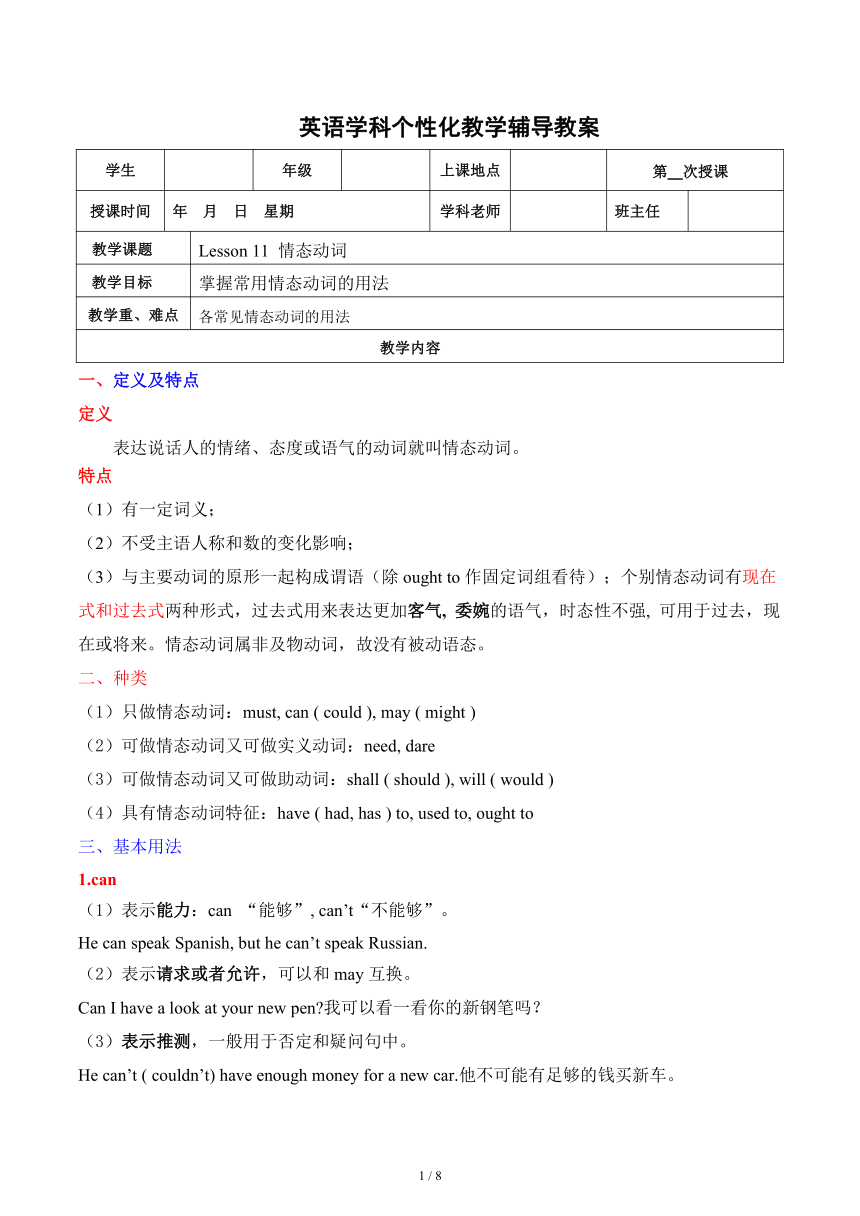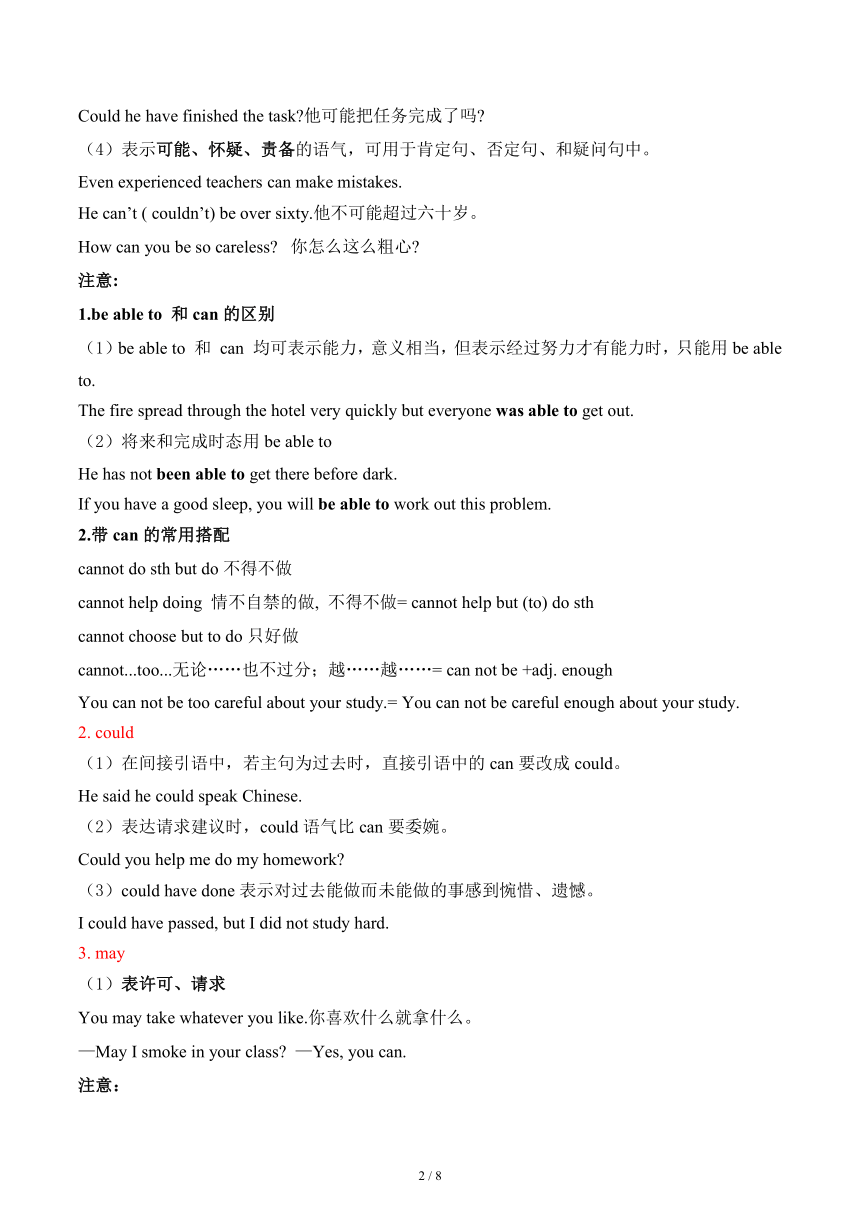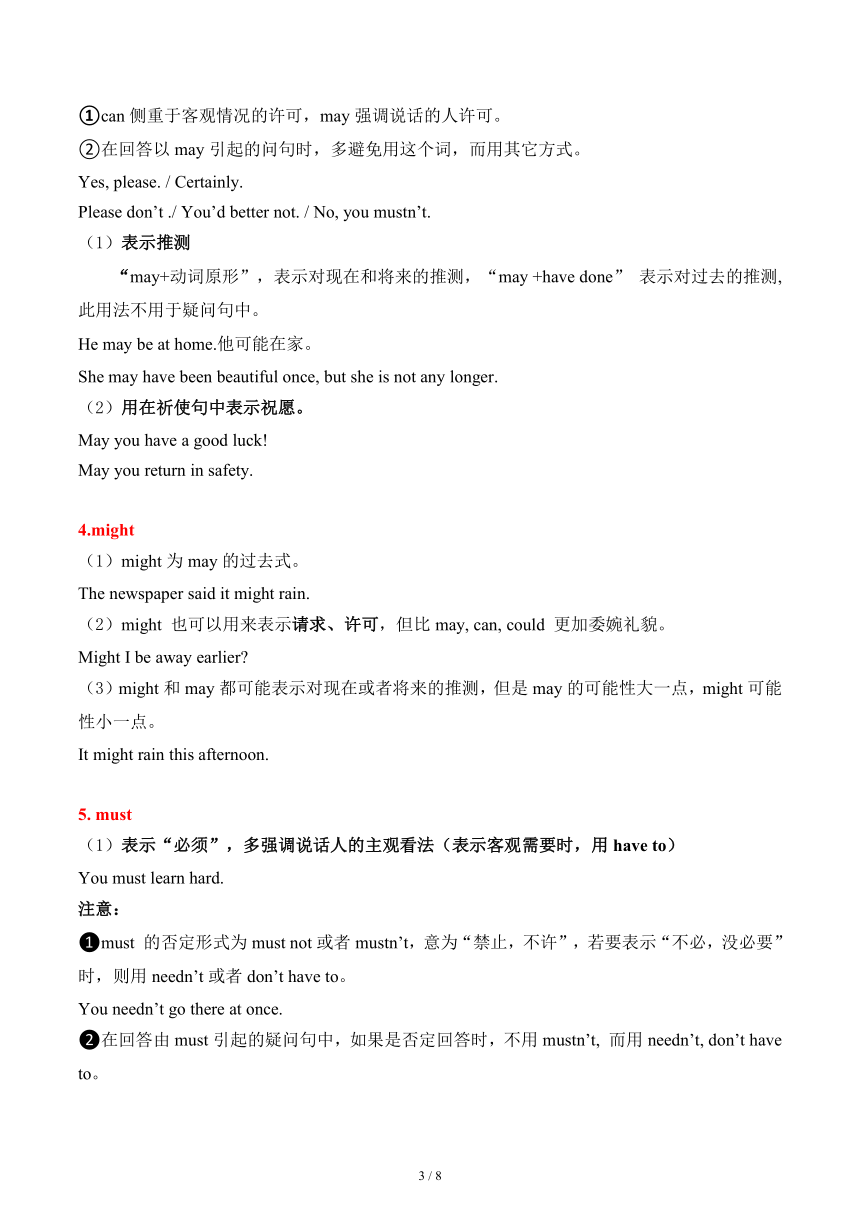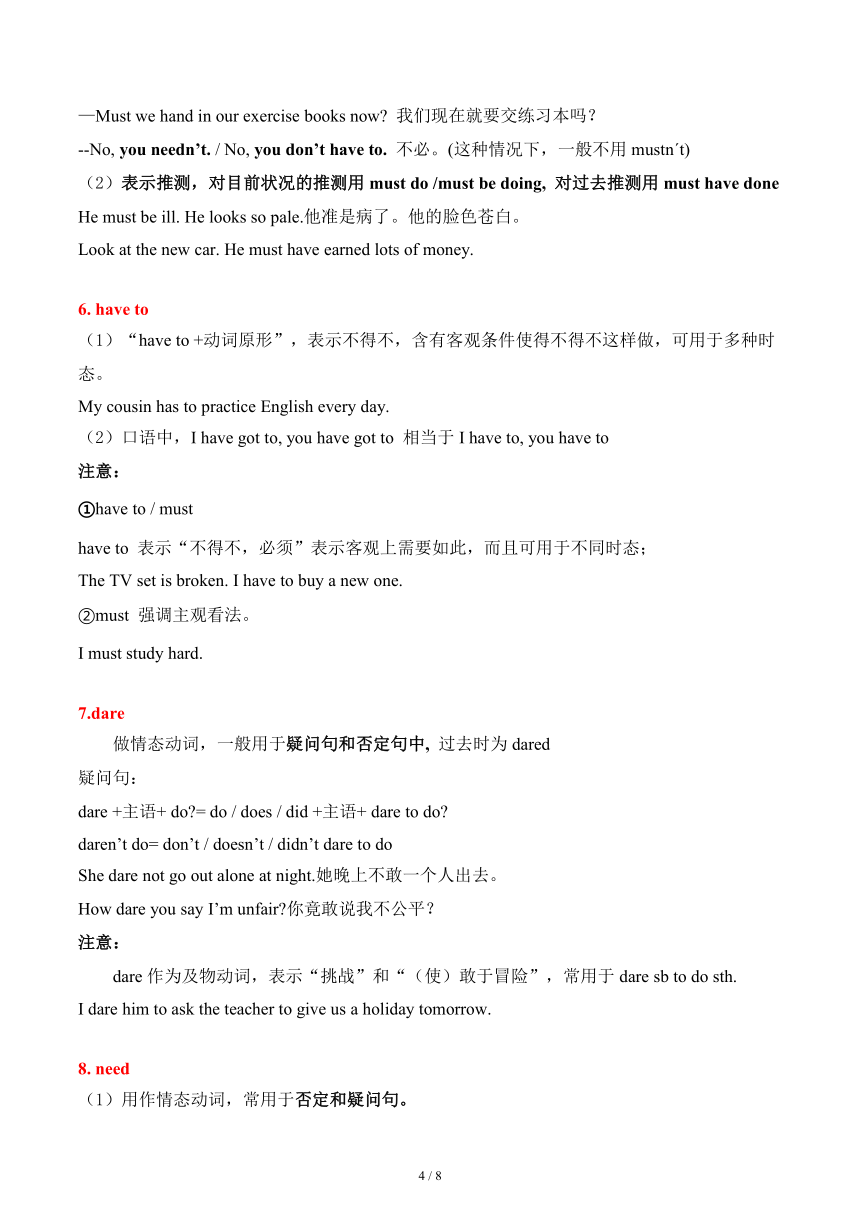2022年中考英语语法专题教案第11讲情态动词(word版)
文档属性
| 名称 | 2022年中考英语语法专题教案第11讲情态动词(word版) |  | |
| 格式 | docx | ||
| 文件大小 | 34.8KB | ||
| 资源类型 | 教案 | ||
| 版本资源 | 通用版 | ||
| 科目 | 英语 | ||
| 更新时间 | 2022-01-19 08:57:14 | ||
图片预览




文档简介
英语学科个性化教学辅导教案
学生 年级 上课地点 第 次授课
授课时间 年 月 日 星期 学科老师 班主任
教学课题 Lesson 11 情态动词
教学目标 掌握常用情态动词的用法
教学重、难点 各常见情态动词的用法
教学内容
一、定义及特点
定义
表达说话人的情绪、态度或语气的动词就叫情态动词。
特点
(1)有一定词义;
(2)不受主语人称和数的变化影响;
(3)与主要动词的原形一起构成谓语(除ought to作固定词组看待);个别情态动词有现在式和过去式两种形式,过去式用来表达更加客气, 委婉的语气,时态性不强, 可用于过去,现在或将来。情态动词属非及物动词,故没有被动语态。
二、种类
(1)只做情态动词:must, can ( could ), may ( might )
(2)可做情态动词又可做实义动词:need, dare
(3)可做情态动词又可做助动词:shall ( should ), will ( would )
(4)具有情态动词特征:have ( had, has ) to, used to, ought to
三、基本用法
1.can
(1)表示能力:can “能够”, can’t“不能够”。
He can speak Spanish, but he can’t speak Russian.
(2)表示请求或者允许,可以和may互换。
Can I have a look at your new pen 我可以看一看你的新钢笔吗?
(3)表示推测,一般用于否定和疑问句中。
He can’t ( couldn’t) have enough money for a new car.他不可能有足够的钱买新车。
Could he have finished the task 他可能把任务完成了吗
(4)表示可能、怀疑、责备的语气,可用于肯定句、否定句、和疑问句中。
Even experienced teachers can make mistakes.
He can’t ( couldn’t) be over sixty.他不可能超过六十岁。
How can you be so careless 你怎么这么粗心
注意:
1.be able to 和can的区别
(1)be able to 和 can 均可表示能力,意义相当,但表示经过努力才有能力时,只能用be able to.
The fire spread through the hotel very quickly but everyone was able to get out.
(2)将来和完成时态用be able to
He has not been able to get there before dark.
If you have a good sleep, you will be able to work out this problem.
2.带can的常用搭配
cannot do sth but do不得不做
cannot help doing 情不自禁的做, 不得不做= cannot help but (to) do sth
cannot choose but to do只好做
cannot...too...无论……也不过分;越……越……= can not be +adj. enough
You can not be too careful about your study.= You can not be careful enough about your study.
2. could
(1)在间接引语中,若主句为过去时,直接引语中的can要改成could。
He said he could speak Chinese.
(2)表达请求建议时,could语气比can要委婉。
Could you help me do my homework
(3)could have done表示对过去能做而未能做的事感到惋惜、遗憾。
I could have passed, but I did not study hard.
3. may
(1)表许可、请求
You may take whatever you like.你喜欢什么就拿什么。
—May I smoke in your class —Yes, you can.
注意:
①can侧重于客观情况的许可,may强调说话的人许可。
②在回答以may引起的问句时,多避免用这个词,而用其它方式。
Yes, please. / Certainly.
Please don’t ./ You’d better not. / No, you mustn’t.
(1)表示推测
“may+动词原形”,表示对现在和将来的推测,“may +have done” 表示对过去的推测, 此用法不用于疑问句中。
He may be at home.他可能在家。
She may have been beautiful once, but she is not any longer.
(2)用在祈使句中表示祝愿。
May you have a good luck!
May you return in safety.
4.might
(1)might为may的过去式。
The newspaper said it might rain.
(2)might 也可以用来表示请求、许可,但比may, can, could 更加委婉礼貌。
Might I be away earlier
(3)might和may都可能表示对现在或者将来的推测,但是may的可能性大一点,might可能性小一点。
It might rain this afternoon.
5. must
(1)表示“必须”,多强调说话人的主观看法(表示客观需要时,用have to)
You must learn hard.
注意:
must 的否定形式为must not或者mustn’t,意为“禁止,不许”,若要表示“不必,没必要”时,则用needn’t或者don’t have to。
You needn’t go there at once.
在回答由must引起的疑问句中,如果是否定回答时,不用mustn’t, 而用needn’t, don’t have to。
—Must we hand in our exercise books now 我们现在就要交练习本吗?
--No, you needn’t. / No, you don’t have to. 不必。(这种情况下,一般不用mustn t)
(2)表示推测,对目前状况的推测用must do /must be doing, 对过去推测用must have done
He must be ill. He looks so pale.他准是病了。他的脸色苍白。
Look at the new car. He must have earned lots of money.
6. have to
(1)“have to +动词原形”,表示不得不,含有客观条件使得不得不这样做,可用于多种时态。
My cousin has to practice English every day.
(2)口语中,I have got to, you have got to 相当于I have to, you have to
注意:
①have to / must
have to 表示“不得不,必须”表示客观上需要如此,而且可用于不同时态;
The TV set is broken. I have to buy a new one.
②must 强调主观看法。
I must study hard.
7.dare
做情态动词,一般用于疑问句和否定句中, 过去时为dared
疑问句:
dare +主语+ do = do / does / did +主语+ dare to do
daren’t do= don’t / doesn’t / didn’t dare to do
She dare not go out alone at night.她晚上不敢一个人出去。
How dare you say I’m unfair 你竟敢说我不公平?
注意:
dare作为及物动词,表示“挑战”和“(使)敢于冒险”,常用于dare sb to do sth.
I dare him to ask the teacher to give us a holiday tomorrow.
8. need
(1)用作情态动词,常用于否定和疑问句。
疑问句:need +主语+do = do / does / did+主语+to do
否定句:needn’t do = don’t / doesn’t / didn’t need to do
(2)在反义疑问句中:
He doesn’t need to finish the homework, does he
He needn’t finish the homework, need he
(3)指过去不需要,有两种情况:
①“didn’t need to +动词原形”,表示过去不必做而实际上也没有做,相当于didn’t have to
We had plenty of bread, so I didn’t need to buy a loaf.
②“needn’t have +过去分词”,表示过去不必做而实际上已经做了。
We had plenty of bread, so I needn’t have bought a loaf.
(4)need其他用法
need doing = need to be done
9. used to
(1)用于肯定句中,表示过去经常发生的动作或者存在的状态,但现在已经不存在了。
I don’t smoke these days, but I used to.
(2)疑问句或者否定句有两种形式。
Used he to go to church every Sunday
No, he used not / usedn’t.
Did he use to go to church on Sunday
No, he didn’t.
(3)would / used to
would指过去动作的反复;would常与时间状语every day, often, frequently连用,used to不必every day, often, frequently连用。
used to用于指状态,也可指习惯性动作;used to用以说明过去和现在对比,现在不再重复这一动作。
There used to be a hotel here.
10. shall
(1)用于第一人称陈述句中,表示决心。
I shall never forget that bad treatment.
(2)用于第二、第三人称陈述句,表示“命令、允诺、警告、决心”等意思。
You shall do as I say.按我说的做。(命令)
You shall have my answer tomorrow.你明天可以得到我的答复。(允诺)
He shall be sorry for it one day, I tell you.有一天他会后悔的,我告诉你。(警告)
Nothing shall stop us from carrying out the plan.什么也不能阻止我们执行这项计划(决心)
(3)用于第一、第三人称疑问句,表征询意见。
Shall I get you some tea 我给你点茶好吗?
Shall the boy wait outside 让那男孩在外面等吗?
注意:
回答:Yes, please. / No, thanks.
(4)表示规章、法令语言,主要用于第三人称。
All payment shall be made by the end of this month.
11. should
(1)should作为shall的过去式,用于第一三人称,多用于间接引语当中,以征求对方意见
Mr Lin asked if he should get his visa the next day.
(2)表示责任、义务,意为“应当,应该”。
We should respect our parents.
(3)表示有一定根据的推测,意为“可能,大概”(肯定语气没有must强)。
He should be 60 years old.
(4)表示惊讶、难以置信、或不应该发生的事情,意为“竟然”。
The gentleman should be so rude to a lady.
(5)should +have done 表示本来应该做而没有做。
should not have + done表示本来不应该做而做了
You should have finished your homework.
12 .ought to
(1)ought to do 指现在或者将来应该做某事情,表示“有义务”或者“必要”。含劝告或推测之意。
Your new suit ought to be ready on Tuesday.
(2)ought to have done的肯定式表示“应该做而未做”,否定式表示“不该做的事情确做了”,常含谴责之意。
You ought to have done the exercise carefully.
(3) ought to 与should
should多表示自己主观看法;ought to 多表示客观情况,在谈到法律,义务,和规定等要求应该做某事。
ought to have done 和should have done 可以替代,表示应该做而没有做,含有谴责之意。
13. will
(1)表意愿、意图和决心,意为“要,愿”,用于各种人称。
I will do anything for you.我愿为你做任何事。
注意:
will表示将来时,不用于条件状语从句中,但是情态动词表示意愿则可以。
If you will read the book, I’ll lend it to you.如果你愿意读这本书,我会把它借给你。
(2)表“请,请求”,用于第二人称疑问句中。
Will you close the window It’s a bit cold.请你把窗户关上好吗?有点冷。
Won’t you drink some more coffee 再来一点咖啡好吗?
(3)表示经常性、习惯性、倾向性等动作,意思为“经常,习惯于,总是”。
Fish will die out of water.鱼离开水就不能活。
The door won’t open. 这门打不开。
14. would
(1)做为will的过去式,用于间接引语中,表示意志。
She said that she would do it.
(2)用在第二人称疑问句中,提出请求或征求意见,比will 更客气。
Would you like another glass of beer 再来杯啤酒好吗?
注意:
否定句中,would not 表示坚决地拒绝。
He would not let me enter the classroom. 他拒绝让我进教室。
(3)表示过去的习惯动作或某种倾向。
On Sundays he would sit for hours saying nothing.
学生 年级 上课地点 第 次授课
授课时间 年 月 日 星期 学科老师 班主任
教学课题 Lesson 11 情态动词
教学目标 掌握常用情态动词的用法
教学重、难点 各常见情态动词的用法
教学内容
一、定义及特点
定义
表达说话人的情绪、态度或语气的动词就叫情态动词。
特点
(1)有一定词义;
(2)不受主语人称和数的变化影响;
(3)与主要动词的原形一起构成谓语(除ought to作固定词组看待);个别情态动词有现在式和过去式两种形式,过去式用来表达更加客气, 委婉的语气,时态性不强, 可用于过去,现在或将来。情态动词属非及物动词,故没有被动语态。
二、种类
(1)只做情态动词:must, can ( could ), may ( might )
(2)可做情态动词又可做实义动词:need, dare
(3)可做情态动词又可做助动词:shall ( should ), will ( would )
(4)具有情态动词特征:have ( had, has ) to, used to, ought to
三、基本用法
1.can
(1)表示能力:can “能够”, can’t“不能够”。
He can speak Spanish, but he can’t speak Russian.
(2)表示请求或者允许,可以和may互换。
Can I have a look at your new pen 我可以看一看你的新钢笔吗?
(3)表示推测,一般用于否定和疑问句中。
He can’t ( couldn’t) have enough money for a new car.他不可能有足够的钱买新车。
Could he have finished the task 他可能把任务完成了吗
(4)表示可能、怀疑、责备的语气,可用于肯定句、否定句、和疑问句中。
Even experienced teachers can make mistakes.
He can’t ( couldn’t) be over sixty.他不可能超过六十岁。
How can you be so careless 你怎么这么粗心
注意:
1.be able to 和can的区别
(1)be able to 和 can 均可表示能力,意义相当,但表示经过努力才有能力时,只能用be able to.
The fire spread through the hotel very quickly but everyone was able to get out.
(2)将来和完成时态用be able to
He has not been able to get there before dark.
If you have a good sleep, you will be able to work out this problem.
2.带can的常用搭配
cannot do sth but do不得不做
cannot help doing 情不自禁的做, 不得不做= cannot help but (to) do sth
cannot choose but to do只好做
cannot...too...无论……也不过分;越……越……= can not be +adj. enough
You can not be too careful about your study.= You can not be careful enough about your study.
2. could
(1)在间接引语中,若主句为过去时,直接引语中的can要改成could。
He said he could speak Chinese.
(2)表达请求建议时,could语气比can要委婉。
Could you help me do my homework
(3)could have done表示对过去能做而未能做的事感到惋惜、遗憾。
I could have passed, but I did not study hard.
3. may
(1)表许可、请求
You may take whatever you like.你喜欢什么就拿什么。
—May I smoke in your class —Yes, you can.
注意:
①can侧重于客观情况的许可,may强调说话的人许可。
②在回答以may引起的问句时,多避免用这个词,而用其它方式。
Yes, please. / Certainly.
Please don’t ./ You’d better not. / No, you mustn’t.
(1)表示推测
“may+动词原形”,表示对现在和将来的推测,“may +have done” 表示对过去的推测, 此用法不用于疑问句中。
He may be at home.他可能在家。
She may have been beautiful once, but she is not any longer.
(2)用在祈使句中表示祝愿。
May you have a good luck!
May you return in safety.
4.might
(1)might为may的过去式。
The newspaper said it might rain.
(2)might 也可以用来表示请求、许可,但比may, can, could 更加委婉礼貌。
Might I be away earlier
(3)might和may都可能表示对现在或者将来的推测,但是may的可能性大一点,might可能性小一点。
It might rain this afternoon.
5. must
(1)表示“必须”,多强调说话人的主观看法(表示客观需要时,用have to)
You must learn hard.
注意:
must 的否定形式为must not或者mustn’t,意为“禁止,不许”,若要表示“不必,没必要”时,则用needn’t或者don’t have to。
You needn’t go there at once.
在回答由must引起的疑问句中,如果是否定回答时,不用mustn’t, 而用needn’t, don’t have to。
—Must we hand in our exercise books now 我们现在就要交练习本吗?
--No, you needn’t. / No, you don’t have to. 不必。(这种情况下,一般不用mustn t)
(2)表示推测,对目前状况的推测用must do /must be doing, 对过去推测用must have done
He must be ill. He looks so pale.他准是病了。他的脸色苍白。
Look at the new car. He must have earned lots of money.
6. have to
(1)“have to +动词原形”,表示不得不,含有客观条件使得不得不这样做,可用于多种时态。
My cousin has to practice English every day.
(2)口语中,I have got to, you have got to 相当于I have to, you have to
注意:
①have to / must
have to 表示“不得不,必须”表示客观上需要如此,而且可用于不同时态;
The TV set is broken. I have to buy a new one.
②must 强调主观看法。
I must study hard.
7.dare
做情态动词,一般用于疑问句和否定句中, 过去时为dared
疑问句:
dare +主语+ do = do / does / did +主语+ dare to do
daren’t do= don’t / doesn’t / didn’t dare to do
She dare not go out alone at night.她晚上不敢一个人出去。
How dare you say I’m unfair 你竟敢说我不公平?
注意:
dare作为及物动词,表示“挑战”和“(使)敢于冒险”,常用于dare sb to do sth.
I dare him to ask the teacher to give us a holiday tomorrow.
8. need
(1)用作情态动词,常用于否定和疑问句。
疑问句:need +主语+do = do / does / did+主语+to do
否定句:needn’t do = don’t / doesn’t / didn’t need to do
(2)在反义疑问句中:
He doesn’t need to finish the homework, does he
He needn’t finish the homework, need he
(3)指过去不需要,有两种情况:
①“didn’t need to +动词原形”,表示过去不必做而实际上也没有做,相当于didn’t have to
We had plenty of bread, so I didn’t need to buy a loaf.
②“needn’t have +过去分词”,表示过去不必做而实际上已经做了。
We had plenty of bread, so I needn’t have bought a loaf.
(4)need其他用法
need doing = need to be done
9. used to
(1)用于肯定句中,表示过去经常发生的动作或者存在的状态,但现在已经不存在了。
I don’t smoke these days, but I used to.
(2)疑问句或者否定句有两种形式。
Used he to go to church every Sunday
No, he used not / usedn’t.
Did he use to go to church on Sunday
No, he didn’t.
(3)would / used to
would指过去动作的反复;would常与时间状语every day, often, frequently连用,used to不必every day, often, frequently连用。
used to用于指状态,也可指习惯性动作;used to用以说明过去和现在对比,现在不再重复这一动作。
There used to be a hotel here.
10. shall
(1)用于第一人称陈述句中,表示决心。
I shall never forget that bad treatment.
(2)用于第二、第三人称陈述句,表示“命令、允诺、警告、决心”等意思。
You shall do as I say.按我说的做。(命令)
You shall have my answer tomorrow.你明天可以得到我的答复。(允诺)
He shall be sorry for it one day, I tell you.有一天他会后悔的,我告诉你。(警告)
Nothing shall stop us from carrying out the plan.什么也不能阻止我们执行这项计划(决心)
(3)用于第一、第三人称疑问句,表征询意见。
Shall I get you some tea 我给你点茶好吗?
Shall the boy wait outside 让那男孩在外面等吗?
注意:
回答:Yes, please. / No, thanks.
(4)表示规章、法令语言,主要用于第三人称。
All payment shall be made by the end of this month.
11. should
(1)should作为shall的过去式,用于第一三人称,多用于间接引语当中,以征求对方意见
Mr Lin asked if he should get his visa the next day.
(2)表示责任、义务,意为“应当,应该”。
We should respect our parents.
(3)表示有一定根据的推测,意为“可能,大概”(肯定语气没有must强)。
He should be 60 years old.
(4)表示惊讶、难以置信、或不应该发生的事情,意为“竟然”。
The gentleman should be so rude to a lady.
(5)should +have done 表示本来应该做而没有做。
should not have + done表示本来不应该做而做了
You should have finished your homework.
12 .ought to
(1)ought to do 指现在或者将来应该做某事情,表示“有义务”或者“必要”。含劝告或推测之意。
Your new suit ought to be ready on Tuesday.
(2)ought to have done的肯定式表示“应该做而未做”,否定式表示“不该做的事情确做了”,常含谴责之意。
You ought to have done the exercise carefully.
(3) ought to 与should
should多表示自己主观看法;ought to 多表示客观情况,在谈到法律,义务,和规定等要求应该做某事。
ought to have done 和should have done 可以替代,表示应该做而没有做,含有谴责之意。
13. will
(1)表意愿、意图和决心,意为“要,愿”,用于各种人称。
I will do anything for you.我愿为你做任何事。
注意:
will表示将来时,不用于条件状语从句中,但是情态动词表示意愿则可以。
If you will read the book, I’ll lend it to you.如果你愿意读这本书,我会把它借给你。
(2)表“请,请求”,用于第二人称疑问句中。
Will you close the window It’s a bit cold.请你把窗户关上好吗?有点冷。
Won’t you drink some more coffee 再来一点咖啡好吗?
(3)表示经常性、习惯性、倾向性等动作,意思为“经常,习惯于,总是”。
Fish will die out of water.鱼离开水就不能活。
The door won’t open. 这门打不开。
14. would
(1)做为will的过去式,用于间接引语中,表示意志。
She said that she would do it.
(2)用在第二人称疑问句中,提出请求或征求意见,比will 更客气。
Would you like another glass of beer 再来杯啤酒好吗?
注意:
否定句中,would not 表示坚决地拒绝。
He would not let me enter the classroom. 他拒绝让我进教室。
(3)表示过去的习惯动作或某种倾向。
On Sundays he would sit for hours saying nothing.
